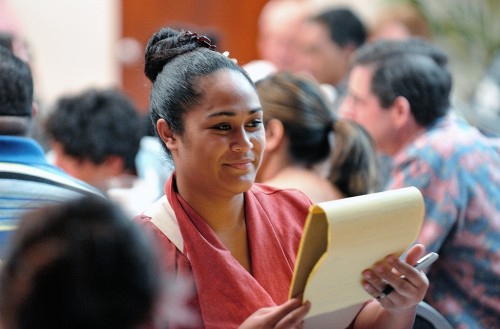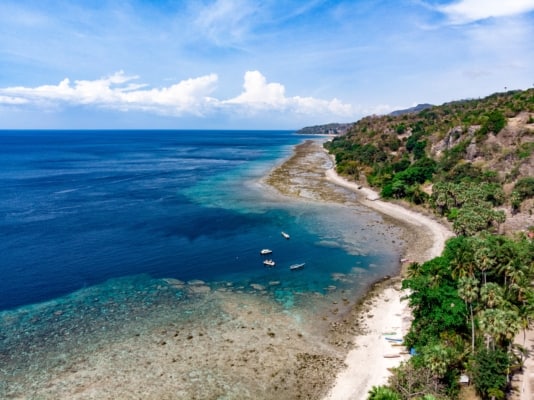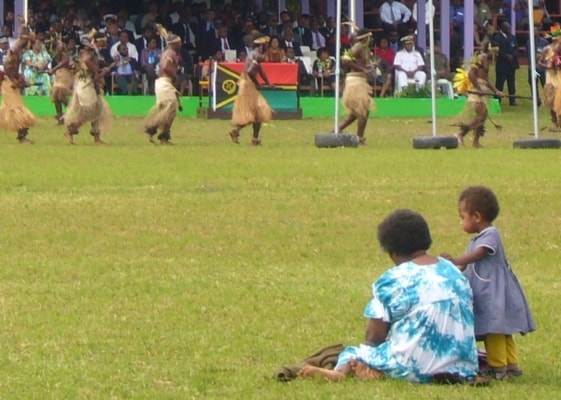Image: A delegate at the Future Leaders of the Pacific Conference, 2013. (Photo: US Embassy, New Zealand.)
Following the elections in Fiji in 2014, women’s representation in parliament is now 14%. This is up from 11% in 2006, but Fiji remains well behind the global average of 21.8%.
To bring women’s participation rates up, we need to understand how members of the community view the role of women in politics, and also their attitudes towards women in leadership more broadly. A recent report on Public Perceptions of Women in Leadership provides this insight for Fiji.
The study, undertaken by the Fiji Women’s Forum in partnership with International Women’s Development Agency (IWDA), offers a snapshot of public attitudes towards women in leadership in the lead-up to Fiji’s 2014 general elections. It draws on responses from more than 1400 participants, solicited through survey questionnaires, focus group discussions, and key informant interviews.
The research was supported through the Funding Leadership and Opportunities for Women program, funded by the Government of the Netherlands. It was led by Patrina Dumaru and Sarah Pene, who also wrote the research report, with input from the Fiji Women’s Forum and IWDA.
The research findings challenge claims that women’s under-representation in parliament reflects a low level of community openness to women in political leadership. The majority of people in Fiji feel that women are under-represented in government, and that increased women’s representation in politics would be beneficial to the nation as a whole.
Two contrasting findings were particularly interesting.
The language of the ‘leader’ continues to prompt images of men in the public imagination. When asked to name a political leader whose leadership style they viewed positively, almost 80% named a man, compared to 6% who named a woman. In the responses to the same question, three times as many different male leaders were named (36) compared to women leaders (12). Since women occupy a much smaller percentage of past and current political leadership roles than men, this is unsurprising. It was notable, though, that women recalled women demonstrating positive leadership more readily than men, naming 12 different women across the sample, while men named five.
When the focus is shifted to ‘leadership’ – what it is and what leadership qualities are valued – we see strong support for a greater role for women. Participants were asked to assess the traits of a good leader, and whether these were more typically male traits, female traits, or equally true of men and women. The results? The traits perceived as more ‘gendered’ ones were not those considered most important for political leadership. Participants most frequently mentioned being hardworking, honest, and intelligent as essential or very important for leadership and these were considered by the majority of people to be equally true of men and women. Women were generally considered ‘entirely capable’ of being involved in electoral politics, if they had the interest and confidence to do so, and if there were more encouragement from their communities and the wider society.
So why might the lower rates of participation, and election, persist? Among the key factors, suggests the study, are problems of self-perception and a preference for older candidates.
- The majority of respondents did not view a lack of experience or a lack of education as being the major reason why women have stood for election less often than men. Interestingly, though, female respondents gave these factors as the main reasons why they themselves would not consider standing for election. Efforts to encourage more women political candidates need to address women’s perception that their education and experience is a barrier to standing for election.
- For young women, their age is an additional barrier to political representation. Comparing whether age or gender was more important, both women and men more readily expressed a preference for electing candidates aged between 45 and 60 rather than younger candidates, and less readily expressed a preference for either male or female candidates.
Given the challenges to representation faced by young women, policy and programs could be developed to help them gain experience of leadership earlier. So, for example, investment in initiatives such as inter-generational community discussions, led by young women, could provide additional opportunities for their development as leaders. At the same time this would demonstrate to other community members what young women bring to decision making.
The research has shown that the majority of women and men in Fiji are seeing the value of women’s full participation in decision-making processes across all areas of life. While this indicates attitudes are changing, it seems that they are yet to be fully reflected in electoral politics and public debates where the framing of the concepts of leaders and leadership occurs.
To accelerate change requires specific strategies that target spaces where change is underway, such as among women and the young, and where it has been slower. This research provides a basis for targeting such support by identifying these emerging changes.
Although people continue to see ‘leaders’ as men, they also readily recognise and appreciate women’s leadership capacities. This suggests that a key component of programs supporting women’s political leadership should be the framing of leadership discussion around the qualities and capacities needed for good leadership, and how experience outside politics can translate into this sphere.









